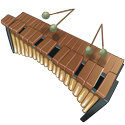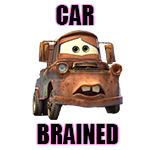|
At various points in my life, people have attempted to explain the difference in feel between 6/8 and 6/4. All the descriptions were pretty hand-wavy. Is it just a notation difference?
|
|
|
|

|
| # ? May 13, 2024 22:33 |
|
cruft posted:At various points in my life, people have attempted to explain the difference in feel between 6/8 and 6/4. All the descriptions were pretty hand-wavy. Jigs would be difficult in 6/4. I mean as long as it’s a multiple of two you can kind of just divide wherever, I guess, but a lot of them are going to be a lot more legible than others. But especially like a proper jig someone is supposed to dance to would be really god drat hard to write in 6/4. The point of notation is communication after all.
|
|
|
|
Xiahou Dun posted:Jigs would be difficult in 6/4. I mean as long as it’s a multiple of two you can kind of just divide wherever, I guess, but a lot of them are going to be a lot more legible than others. So it's just a notation thing? There's no difference in how the music would sound?
|
|
|
|
cruft posted:So it's just a notation thing? There's no difference in how the music would sound? Yeah kinda. You can always halve/double everything until it comes out the same. It’ll just be really ungainly. Please don’t rewrite jigs in 6/4.
|
|
|
|
Flipperwaldt posted:The reason all software to do it is ancient is that modern computers are powerful enough to just use a whole DAW for the purpose. Even if you're only routing to hardware instruments, the assumption is that you're going to record their output into the DAW at some point anyway. i need to learn a daw, but every time I try, i end up in this massive anxiety attack because i don't know what I'm doing and there's like ten-year-olds with record deals because they can run a daw and they're almost too powerful for anything i know how to do all the music I've recorded in the past has been micing live instruments and recording into audition/cool edit pro i never understood midi, probably because i can't play keyboards. I'm okay at loving with settings in menus, but even your most basic daw with your most basic sound plugins gives you like five billion knobs to turn and settings to gently caress with before you even press a key I've got a controller, but I mostly just play it through dexed, a standalone dx7-style software synth i found online once, making 80s noises and dicking with the arpeggiator i think i need a hands-on instructor, because i hate looking at videos to learn things and the documentation makes my eyes glaze over. idk where to even get something like that two instructors, i guess. unlike guitar, i don't think I'll be able to teach myself keys on my own
|
|
|
|
The time signature affects how the composer and performer think about the piece's structure. While you can write any music piece in any signature, generally you choose one where the phrases and notes fit neatly into the measures. So I would expect a 6/4 piece to be fairly slow/meandering, since there's so much space in each measure to fit notes in. A 6/8 piece would be more conventionally-paced.
|
|
|
|
cruft posted:At various points in my life, people have attempted to explain the difference in feel between 6/8 and 6/4. All the descriptions were pretty hand-wavy. There's a social/contextual aspect to it as mentioned above, but it's also worth mentioning that 6/8 is just way easier to read on the page than 6/4. The beams on note groups give you a quick visual indicator of where the beats lie, and you can't get that in 6/4 because you can't beam quarter-notes.
|
|
|
|
Like this is the Lark in the Morning. It’s very pretty and 6/8 as gently caress. You could in theory write it in 6/2. It’d suck and be significantly more page-space, but you could do it. Then someone would read it, plink around because it’s written crazy, then eventually they might realize it’s the Lark in the Morning. No matter what they’re gonna think you’re an rear end in a top hat. It’s notation for communicating, not secret music incantations.
|
|
|
|
How do people name drum patterns? Like, for other instruments we have names for chords and chord progressions. I'm trying to find a fitting name for this drum pattern https://voca.ro/1o3qw0wXshWX It's pretty basic with snares on 2 and 4, but it has kicks on every "and"-beat. EDIT: Ugh I ended up asking ChatGPT and it suggested calling it a "syncopated or offbeat four-on-the-floor"-beat which makes sense. Mr. Mojangles fucked around with this message at 16:30 on Jul 6, 2023 |
|
|
|
hexwren posted:i need to learn a daw, but every time I try, i end up in this massive anxiety attack because i don't know what I'm doing and there's like ten-year-olds with record deals because they can run a daw and they're almost too powerful for anything i know how to do The Goon Music Academy discord has a DAW questions channel, could be a place to start. I'm also sure nobody would mind if you started posting here with every little thing
|
|
|
|
Thanks for the time signature advice. It sounds like for people who don't read music, the bottom number is irrelevant. Like, dancers. Except, wait... TooMuchAbstraction posted:The time signature affects how the composer and performer think about the piece's structure. While you can write any music piece in any signature, generally you choose one where the phrases and notes fit neatly into the measures. So I would expect a 6/4 piece to be fairly slow/meandering, since there's so much space in each measure to fit notes in. A 6/8 piece would be more conventionally-paced. TooMuchAbstraction, if I wrote out Brahm's Lullaby in 4/4 at 80 quarter notes per minute, how would that be played differently than 4/8 at 40 quarter notes per minute? I'm not trying to play gotcha, I'm seriously trying to understand this, because it's pretty much the same as what I've failed to understand for years.
|
|
|
|
cruft posted:Thanks for the time signature advice. It sounds like for people who don't read music, the bottom number is irrelevant. Like, dancers. 6/8 is a compound meter (meaning it’s divided by 3, whether or not it can also be divided by 2), whereas 6/4 is a duple meter (meaning it’s divided by 2, whether or not it can also be divided by 3) practically, this means 6/8 gets two beats, the 1 and 4 (ONE two three FOUR five six), whereas 6/4 gets six beats (ONE and TWO and THREE and FOUR and FIVE and SIX and) say both of those out loud, with the all caps numbers louder. notice how it’s easier to say the 6/8 one faster, and it feels “round” or “bouncy”, whereas 6/4 is harder to say faster (not impossible, harder) and feels more rigid or square. those louder numbers are where you would step while dancing everyone’s go-to example of 6/8 is House of the Rising Sun by The Animals. another example is Sing by the Dresden Dolls. try stepping to these as if they’re 6/8 (on 1 and 4). then try stepping to them as if they’re 6/4 (on 1, 2, 3, 4, 5, and 6). which is easier? a good example of 6/4 is Electric Feel by MGMT. try stepping to this as if it’s 6/4 (on 1, 2, 3, 4, 5, and 6). then try stepping to it as if it’s 6/8 (on 1 and 4). which is easier?
|
|
|
|
Jazz Marimba posted:6/8 is a compound meter (meaning it’s divided by 3, whether or not it can also be divided by 2), whereas 6/4 is a duple meter (meaning it’s divided by 2, whether or not it can also be divided by 3) Oh, so it's about subdividing the beat and when the downbeats occur in a measure. Okay. This tracks. It reminds me of reading about Philip Glass's discovery that he needed to rewrite parts in 1/4 (I think) in order to get the musicians to stop playing downbeats.
|
|
|
|
cruft posted:Oh, so it's about subdividing the beat and when the downbeats occur in a measure. subdividing not really, but beats yes—you can subdivide 6/8 just as much, see both of those examples but especially Sing since it’s very obviously subdivided to the 16th, sometimes 32nd level. despite this, it’s still two beats—ONE and two and three and FOUR and five and six and i cannot emphasize enough how helpful it is to do the counting and stepping i described previously; music is something to be felt first and intellectualized later, which is why we have both 6/8 and 6/4, and not just one of them
|
|
|
|
hexwren posted:i need to learn a daw, but every time I try, i end up in this massive anxiety attack because i don't know what I'm doing and there's like ten-year-olds with record deals because they can run a daw and they're almost too powerful for anything i know how to do Download, install, open it. Go to Options > Midi Devices. The virtual Midinous port should show up as an input port. The hardware output as an output port. Select each and not any other ports. Leave the Automatically attach Inputs to Outputs during selection checkbox checked. Click OK. One is now connected to the other. You can minimize the program, you don't have to look at it any further.
|
|
|
|
Flipperwaldt posted:The reason all software to do it is ancient is that modern computers are powerful enough to just use a whole DAW for the purpose. Even if you're only routing to hardware instruments, the assumption is that you're going to record their output into the DAW at some point anyway. Thanks for that. I hate that this is the case but I guess I can live with it. I was expecting to run this software like a typical midi controller and adding in a DAW that I have no intention of using feels like overkill to me. But I can see the value if I ever decide to record it.
|
|
|
|
xzzy posted:Thanks for that.
|
|
|
|
Planning on getting my music production back in gear in earnest once I'm set up in my new apartment here. Got all my instruments packed up at the moment really, but I got a 1010music Black Box a while back for drum duties and I really need to gather some samples for it. Anyone know of some good resources for like, just a dickload of different drum samples? Planning on doing some processing and manipulation on them both through my DAW and my Electribe, but looking for good raw materials to start off with. Been getting some good sounds out of my Boss DR550 samples, and I've got decent 808 and 909 options, but I definitely could use more live drum samples for instance.
|
|
|
|
Loopcloud - https://www.loopcloud.com/cloud/
|
|
|
|
The stickies and mega thread OPs I'd usually consult before asking a dumb question look very out of date, so here goes. Is it possible for an absolute beginner to play and record input from a single USB keyboard without any other specialized hardware? We have like three different paid programs including Pro Tools, MPC Beats, and Ableton. We don't have a separate MIDI interface besides whatever is built into the keyboard. Related, there is a major problem component between the chair and the keyboard, which encompasses a broad range of issues like not knowing what programs are considered DAWs or whether you need a DAW for this specifically. If it helps, some software like Beats recognizes the keyboard but doesn't register input. Other programs, Audacity in particular, can't find the keyboard at all.
|
|
|
|
Captain Walker posted:Is it possible for an absolute beginner to play and record input from a single USB keyboard without any other specialized hardware? We have like three different paid programs including Pro Tools, MPC Beats, and Ableton. We don't have a separate MIDI interface besides whatever is built into the keyboard. Related, there is a major problem component between the chair and the keyboard, which encompasses a broad range of issues like not knowing what programs are considered DAWs or whether you need a DAW for this specifically. yes, but you need something to be actually making the sound, whether thats a DAW or a free-standing software synth or whatever. a USB keyboard (if you mean what I think you mean) is just a controller, so you need something for it to control. Ableton comes with a lot of fun instruments, so if you already have that installed I'd just go with that. you can add the keyboard in the link/midi section under preferences. iirc, ableton comes with a pretty good basic tutorial to get you started on how the interface works and everything, it might look overwhelming at first but its not that complicated. you shouldn't need any additional hardware. Earwicker fucked around with this message at 20:03 on Jul 15, 2023 |
|
|
|
Earwicker posted:yes, but Yeah, the keyboard is a MIDI controller. Thinking of it that way helps; controllers are a means of input, and you need the right software for output (in this case Ableton, if I can find the tutorial.) quote:you shouldn't need any additional hardware. That's also important! Thank you! 
|
|
|
|
All the softwares mentioned are DAWs. Audacity is an outlier in that it can't record or play back midi. Most other DAWs will be suitable. As said, it's probably necessary to manually connect in software the incoming midi signals to a sound engine, in most cases called a plugin. Then, to hear what you're actually playing live, often enabling record monitoring is required. A problem you might bump into is latency, which is a delay between when you press the keys and the sound coming out. This depends on audio drivers and their settings. In some cases it might be necessary to buy another audio interface (ie another soundcard) that has explicit low latency driver support. Should this be something you bump into and no configuring remedies it, a basic interface should be in the $40-$120 range. No other expense should strictly be necessary.
|
|
|
|
Captain Walker posted:Yeah, the keyboard is a MIDI controller. Thinking of it that way helps; controllers are a means of input, and you need the right software for output (in this case Ableton, if I can find the tutorial.) if you cant find the official tutorial there are a ton of people on youtube explaining the basics of ableton
|
|
|
|
My understanding is that midi isn't actually sound in a way that Audacity can recognize, but more like musical notation, sort of like "middle c synth for 10 seconds starting from 3.14", which you then need to translate into an actual sound in whatever software.
|
|
|
|
BonHair posted:My understanding is that midi isn't actually sound in a way that Audacity can recognize, but more like musical notation, sort of like "middle c synth for 10 seconds starting from 3.14", which you then need to translate into an actual sound in whatever software. basically. midi information contains the pitch, velocity, and timing. it doesnt contain any information about what instrument is involved. so you can take the exact same midi input or midi file and have it be played by all kinds of different software instruments audacity just records raw audio. most DAWs have the options to record raw audio and have various software plugins that are midi instruments
|
|
|
|
Not even pitch, just the number of the key pressed and optionally a bend offset. This is open to interpretation by the sound engine. Note off is also a separate signal, so duration of a note isn't explicit. This used to have consequences when you sliced up midi clips halfway through notes. Cubase used to have a prominent panic button to shut up hanging notes.
|
|
|
|
I've pulled out my trumpet after nearly a decade and have decided I want to get back to playing it, but one of the reasons I stopped was I'd moved into an apartment. Are there mutes that don't just reshape the sound, but fully dampen the output? I'd rather not give the locals even more reason to hate me.
|
|
|
|
SSHHMute is a solid option also check your lease for info/restrictions: I'm permitted to practice up to 2 hours / day from 08:00-12:30 and 14:30-20:00 at full volume, for example
|
|
|
|
Amusingly, no clauses outside of the normal quiet hours. Just don't want to be a bother to everyone around, because I may have discovered the saddest sound in existence. I barely have an octave at this point, and it's a struggle to get up over a G. My embouchure was never great even back in high school, but it's just pathetic in my current state. So, members of the academy, for your consideration for saddest sound - "Grown rear end man trying to play a trumpet after at least a decade and a half, in the dark of his basement with a terrible cheap mute in the horn so as not to disturb the neighbors too much, while waiting for the power to come back on during an outage."
|
|
|
|
That’s a very sad sound, but surely all of that but with a bassoon would be even sadder, no? I love a bassoon but it’s really the Eeyore of the orchestra. The Eeyorchestra.
|
|
|
|
Keep in mind that if you are running Windows for the computer to run the DAW, I believe you will need an audio interface so you can use ASIO drivers to actually play back the sound in real time as you play the notes, if my understanding of the Windows ecosystem is still accurate.
|
|
|
|
InternetOfTwinks posted:Keep in mind that if you are running Windows for the computer to run the DAW, I believe you will need an audio interface so you can use ASIO drivers to actually play back the sound in real time as you play the notes, if my understanding of the Windows ecosystem is still accurate. There is a software alternative called ASIO4ALL It's not as good as having actual hardware, but it's a start.
|
|
|
|
Keptbroom posted:There is a software alternative called ASIO4ALL
|
|
|
|
I'm trying to work on my timing. Is there something that will show me how far in front or behind a given subdivision I am? Something like the scoring system in Rocksmith but not a game, just a metronome that reads the transients of what you're playing and tells you "you're 5ms ahead of the beat" and so on.
|
|
|
|
Luddite recommendation is using Robert Starer's book with a metronome, recording yourself if necessary
|
|
|
|
It looks like there was a hardware unit that does exactly what I described in the mid-90's, long discontinued. Hilariously called the Russian Dragon (rushin' draggin'). https://www.soundonsound.com/reviews/jeanius-electronics-russian-dragon-rd-r3 I play with a metronome often. I think the problem is that what I hear as on the beat is actually slightly ahead of the beat. I'm in time, just shifted forwards. My thought is that some real-time feedback could help me adjust.
|
|
|
|
any kind of basic spectrometer software would let you easily visualize it, as long as you have a mic picking up the metronome click/beep and whatever you're playing, whether that's an Audacity plugin, something on your DAW, or stand alone software like this but the Starer book is really, really helpful for locking in your subdivisions and helping with rhythmic sight reading skills imo
|
|
|
|
Also the slightly simple option of recording yourself on your phone and listening back to it
|
|
|
|

|
| # ? May 13, 2024 22:33 |
|
I've been through recording myself and inspecting how close the transients are to the grid lines, I'm really after something real-time. But if this book is as good as yous say it is I should probably give it a shot!
|
|
|











 ~*
~*













